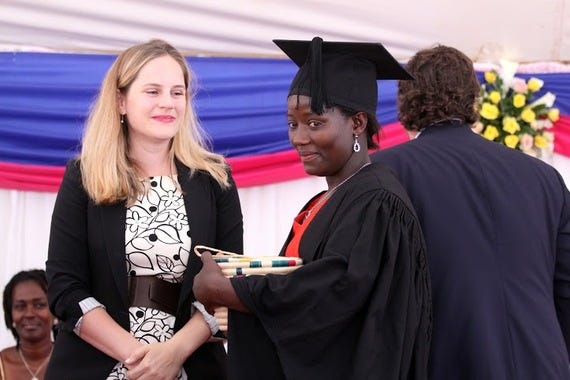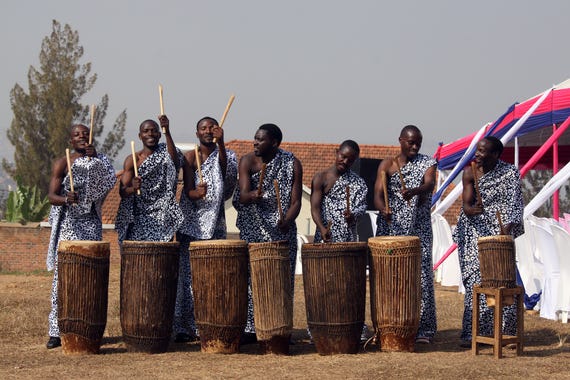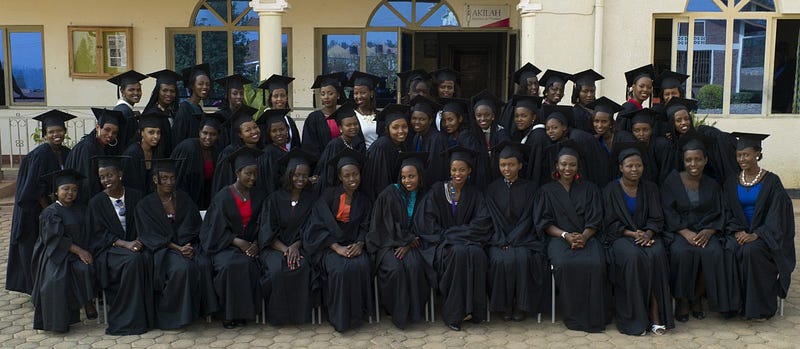Rwanda’s Newest Graduates

Row upon row of eager, hopeful young faces beam towards the podium. The nervous anticipation is palpable. The women talk in small groups, shifting in their seats, waiting for the moment they thought would never come. Hundreds of parents and family members are on hand to witness this impressive milestone.
Today is graduation day, a day of fanfare, unfettered dreams and promise. But this is no ordinary graduation. It is The Akilah Institute for Women in Kigali, Rwanda, the only college for women in East Africa. Scratch Elgar’s “Pomp and Circumstance” and replace it with gospel-inspired Kinyarwandan anthems. Add in liberal amounts of African drumming. Mix with a hundred Rwandan grandmothers all vying for the best spot to catch the perfect photograph.
Scores of young women are now ready to go out into the world to make their mark. Many have jobs already lined up in their chosen career. Most grew up with limited expectations, barely able to imagine their own futures. College was never a part of their vernacular. All have worked tirelessly to be where they are. The obstacles, at times, seeming insurmountable.

“Dad never wanted me to go to school,” said Aisha Nakabanda, 26, appearing serious and professional in a fitted red dress. “People didn’t know that education was good.” Born in Uganda when her family fled the 1994 genocide, Aisha is the fifth born of seven children, three girls, four boys; her father is a practicing Muslim with at least six wives.
Determined to join the other kids at school, Aisha begged her father’s permission until he finally relented. She became the only girl in her family to study up to university. “The hardest thing for me was looking for tuition money,” Aisha explained. At Akilah, students must pay or raise a portion of their annual tuition costs, about $500, as an investment in their future.
To make ends meet, Aisha rose daily at 4:00 am to make pancakes and fruit salad to sell on campus. It was worth it. “I have experience, I have skills, I can knock on any door,” Aisha said. She dreams of owning her own restaurant. “Now that I have confidence, I can do anything.”
Aisha is the proud winner of the Founder’s Award, recognized for excellence in coursework, leadership, and service to the community. Her accomplishments are even more noteworthy given the statistics. Girls’ primary school completion rates in Rwanda and East Africa have never been higher, but fewer than 30% complete secondary school. Only 1% of the population enters college and less than one third of those are female.
Akilah’s three year diplomas in Hospitality Management, Entrepreneurship and Information Systems — high growth sectors — link to employment and, ultimately, economic independence. The college emphasizes academic rigor, leadership and career navigation skills. Ninety percent of alumnae secure jobs within six months of graduation and typically earn five times the average national income — income they use to pay school fees for their siblings and living expenses for their families.
Young women like Aisha are both an anomaly and the key to a better future in a region better known for patriarchy, instability and gender-based violence, where 85% of women work in subsistence agriculture, living on less than $2 a day. Women’s education in East Africa and around the globe has been shown to spur economic growth, reduce infant mortality and the spread of HIV/AIDs, and improve family outcomes.

“I’m proud of being an educated lady,” said Lydia, 23, another graduate. “I want to change the fixed mindset about girls’ education. People think it’s a waste of money because the girl will just get married, but it’s not true,” she said. “I want to be a great person, reliable and dependable, and to help my family financially.”
Anne Niyomubyeyi, valedictorian, probably said it best:
“…Commitment, courage, motivation and passion about our courses were required from us in order to succeed. If not, we would not have passed our courses and be able to celebrate today. We faced so many challenges that could have put us down but we did not give up. Some of those challenges included; lack of tuition fees and daily transportation fees, family responsibilities since some of us are mothers, and working at the night while studying during the day.
Some family members were against women’s education. Others had to negotiate and convince their family members that to educate a woman is to educate the community and the nation. But we overcame all those challenges….We had to stay strong and focused on our set goals for us to join the workforce and contribute to the development of our country, Rwanda.”
Anne’s words continued to resonate across the assembled guests as the graduates rose to accept their diplomas. “…this is not the end but the beginning of greater opportunities ahead of us. Let us go and put into practice the skills that we have acquired. Let us be the change that we want to see in the community.”
Congratulations, Class of 2015.
Karen Sherman is the Executive Director of the Akilah Institute for Women and a Senior Associate on Women’s Economic Empowerment at the Georgetown Institute for Women, Peace and Security. She is the author of the forthcoming book, Surviving Women. Read more from Karen Sherman here.
Cross-posted from Huffington Post
Originally published at www.akilahinstitute.org on August 25, 2015.
